International Women's Day 2022 - #EqualConsent
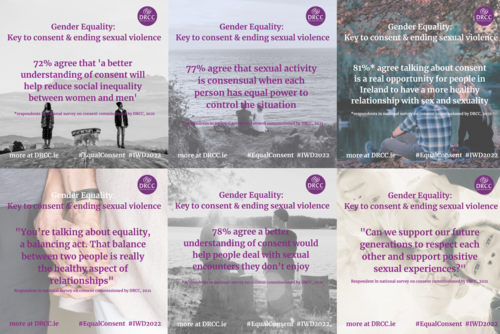
Gender Equality – key to consent & ending sexual violence
As the Citizens Assembly found last year, sexual violence is a gender equality issue. Dublin Rape Crisis Centre is starkly confronted every day with the impact of this connection between gender inequality and sexual violence.
- 8 in 10 callers to the National 24-hour Helpline are women
- 9 in 10 clients of our therapy services are women
- 86% of respondents to our online survey on sexual harassment were women
More widely:
- 1-in-5 women in Ireland have been raped in their lifetime, compared to 1-in-10 men (MU/TCD, 2020)
- Half of women in Ireland have experienced any form of sexual violence compared to approximately 1-in-5 men (MU/TCD, 2020)
- 27% of women worldwide have experienced physical or sexual intimate partner violence in their lifetime – 24% of girls aged 15-19 at least once since age 15 (WHO, 2021)
Moreover, women in the Deaf, migrant, refugee and asylum-seeking communities are at even greater risk. Studies have shown that
- Deaf women and girls are at least twice as likely to experience sexual violence as their hearing peers.
- 69.3% of female migrants, including refugees, have experienced SV since they have entered Europe.
It is clear that sexual violence and gender inequality need to be tackled hand-in-hand - to stop one, we need to stop both. Where does consent come in?
DRCC describes consent as the opposite of sexual violence. It means voluntarily agreeing to engage in sexual activity in a relationship of equal power.
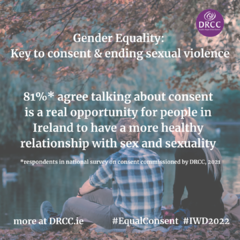 | 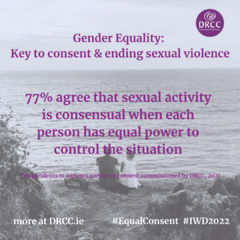 | 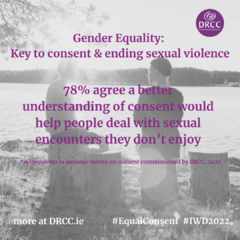 |
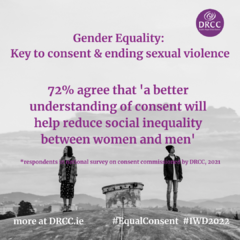 | 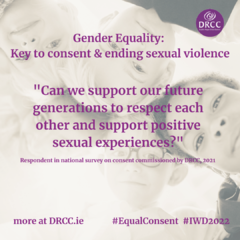 | 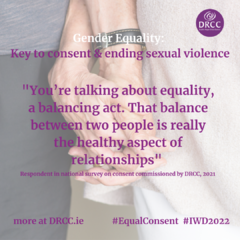 |
This applies to casual sexual encounters and to long-term relationships and everything in between. Our vision of consent is one which is shared, ongoing, that can be withdrawn at any point, and is empowering for all involved.
In sexual encounters and relationships, consent can only be present if there is equality between partners - where power is shared, and there is no coercion, no force or fear. Without consent, we have sexual violence and all the harm and trauma it brings.
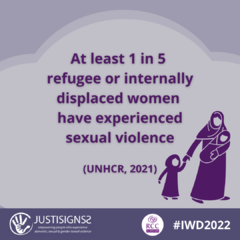 | 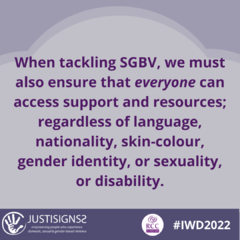 | 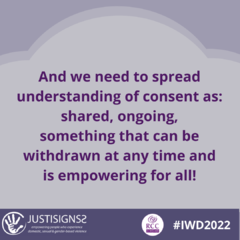 |
Likewise, consent needs equal power among all those involved to exist. So we see gender equality as the foundation for consent and a necessity to end sexual violence.
This interconnection is reflected in findings from DRCC’s recent research into what people in Ireland understand about consent.
- Some 72% agree that 'a better understanding of consent will help reduce social inequality between women and men'
- 77% agree that sexual activity is consensual when each person has equal power to control the situation
- 78% agree a better understanding of consent would help people deal with sexual encounters they don’t enjoy
- 81% agree talking about consent is a real opportunity for people in Ireland to have a more healthy relationship with sex and sexuality.
So let’s get to know consent better - and practice better consent - for a more equal Ireland.
#EqualConsent #IWD2022
- You can read more about our work on consent on our website.
- You can also donate to our work and services - we are so grateful for your support!
- Learn more about the work of our partners in the JUSTISIGNS2 project.
Sources:
- DRCC (2021) Statistical Supplement 2020
- DRCC (2021) Paper on Sexual Harassment & Abuse in the Workplace
- DRCCA (2021) Research shows most people believe Ireland has problem with consent
- WHO (2021) Factsheet on Violence against Women
- MUTCD (2020) Study co-lead by Dr. Philip Hyland finds one in five women have been raped in their lifetime
- World Health Organisation (2016) Bulletin on Sexual Violence against Refugee Women
- Marit Hoem Kvam (2004). Sexual abuse of deaf children. A retrospective analysis of the prevalence and characteristics of childhood sexual abuse among deaf adults in Norway. Child Abuse & Neglect 28(3), 241–251. doi:10.1016/j.chiabu.2003.09.017